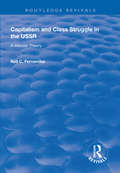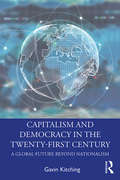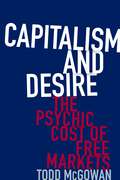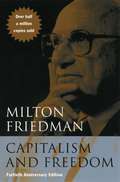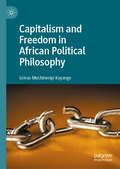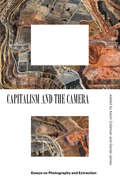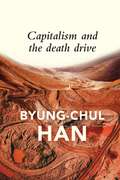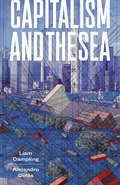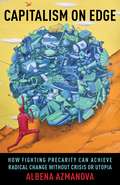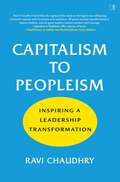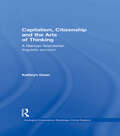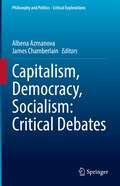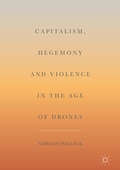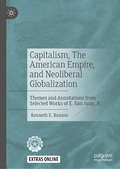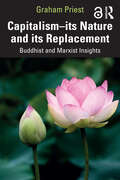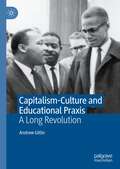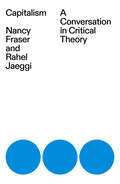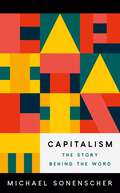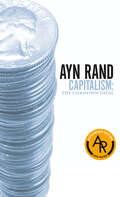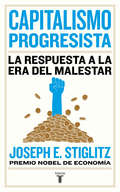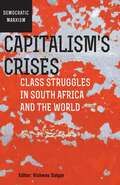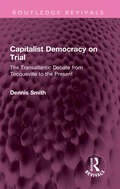- Table View
- List View
Capitalism and Class Struggle in the USSR: A Marxist Theory (Routledge Revivals)
by Neil C. FernandezFirst published in 1997, this was the first Autonomist Marxist book on the USSR. The various theories of Soviet capitalism are considered more comprehensively than in any previous work, and are shown to be inadequate insofar as they fail to demonstrate satisfactorily the predominance of the category of capital. A powerful new theory is developed which does precisely this, introducing the concepts of bureaucratic forms of both exchange-value and money. This constitutes an important contribution to the overall theoretical critique of capital. Attention is then turned to the class struggle. For the first time, the various ’Marxist’ theories of the USSR are systematically considered in relation to what they say about the working class and its struggle.
Capitalism and Democracy in the Twenty-First Century: A Global Future Beyond Nationalism
by Gavin KitchingThis short book makes a connection between recent ‘tectonic shifts’ in the world economy and the political problems currently confronted by western democracies. The shift of manufacturing away from the West, allied to the pressure to keep costs down in an increasingly competitive global economy, has led to economic inequality, reliance on service industry employment and public sector austerity. All this has in turn produced large numbers of desperate citizens attracted to a populist economic nationalism accompanied by xenophobia. However, the originality of this text lies not in the above argument, but in the philosophical reflections which drive and derive from it. These include reflections on history as a supposed causal process; on the need to make ethical judgements of economic activities and the difficulties of doing so; and on the problems confronting modern citizens in understanding complex economic processes and their political implications. Capitalism and Democracy in the Twenty-First Century endorses Wittgenstein’s ‘praxis’ approach to human social life and its study. Accordingly, it not only analyses economic and political problems but suggests ways of solving or mitigating them. In doing so it relies on Marx’s conviction that our capacity to see certain phenomena as problems is at least a priori evidence that they can be solved. This book will appeal to undergraduate and postgraduate students of politics, comparative politics, political economy and international relations.
Capitalism and Desire: The Psychic Cost of Free Markets
by Todd McGowanDespite creating vast inequalities and propping up reactionary world regimes, capitalism has many passionate defenders—but not because of what it withholds from some and gives to others. Capitalism dominates, Todd McGowan argues, because it mimics the structure of our desire while hiding the trauma that the system inflicts upon it. People from all backgrounds enjoy what capitalism provides, but at the same time are told more and better is yet to come. Capitalism traps us through an incomplete satisfaction that compels us after the new, the better, and the more.Capitalism's parasitic relationship to our desires gives it the illusion of corresponding to our natural impulses, which is how capitalism's defenders characterize it. By understanding this psychic strategy, McGowan hopes to divest us of our addiction to capitalist enrichment and help us rediscover enjoyment as we actually experienced it. By locating it in the present, McGowan frees us from our attachment to a better future and the belief that capitalism is an essential outgrowth of human nature. From this perspective, our economic, social, and political worlds open up to real political change. Eloquent and enlivened by examples from film, television, consumer culture, and everyday life, Capitalism and Desire brings a new, psychoanalytically grounded approach to political and social theory.
Capitalism and Freedom (40th Anniversary Edition)
by Milton Friedman Rose D. FriedmanHow can we benefit from the promise of government while avoiding the threat it poses to individual freedom? In this classic book, Milton Friedman provides the definitive statement of his immensely influential economic philosophy -- one in which competitive capitalism serves as both a device for achieving economic freedom and a necessary condition for political freedom. The result is an accessible text that has sold well over half a million copies in English, has been translated into eighteen languages, and shows every sign of becoming more and more influential as time goes on.
Capitalism and Freedom in African Political Philosophy
by Grivas Muchineripi KayangeThis book investigates ‘capitalism and freedom’—the guiding forces of many political systems—in African philosophy. It builds on classical and neoliberal capitalism rooted in private property and freedom, and argues for the presence of these elements in the traditional and modern African political systems. The author argues that while these elements are partly imported from Western capitalists, they are equally traceable in African traditional political systems. Kayange argues that African politics is marred by a conflict between embracing capitalism and freedom (individualism), on the one hand, and socialism founded on African communitarianism and communist ideas, on the other. This conflict has affected policy development and implementation, and has significantly contributed towards the socio-economic and ethical crises that are recurrent in most of the African countries.
Capitalism and modern social theory
by Anthony GiddensGiddens's analysis of the writings of Marx, Durkheim and Weber has become the classic text for any student seeking to understand the three thinkers who established the basic framework of contemporary sociology. The first three sections of the book, based on close textual examination of the original sources, contain separate treatments of each writer. The author demonstrates the internal coherence of their respective contributions to social theory. The concluding section discusses the principal ways in which Marx can be compared with the other two authors, and discusses misconceptions of some conventional views on the subject.
Capitalism and the Camera: Essays on Photography and Extraction
by Daniel James Kevin ColemanA provocative exploration of photography's relationship to capitalism, from leading theorists of visual culture.Photography was invented between the publication of Adam Smith's The Wealth of Nations and Karl Marx and Frederick Engels's The Communist Manifesto. Taking the intertwined development of capitalism and the camera as their starting point, the essays in Capitalism and the Camera investigate the relationship between capitalist accumulation and the photographic image, and ask whether photography might allow us to refuse capitalism's violence--and if so, how?Drawn together in productive disagreement, the essays in this collection explore the relationship of photography to resource extraction and capital accumulation, from 1492 to the postcolonial; the camera's potential to make visible critical understandings of capitalist production and society, especially economies of class and desire; and propose ways that the camera and the image can be used to build cultural and political counterpublics from which a democratic struggle against capitalism might emerge.With essays by Ariella Aïsha Azoulay, Siobhan Angus, Kajri Jain, Walter Benn Michaels, T. J. Clark, John Paul Ricco, Blake Stimson, Chris Stolarski, Tong Lam, and Jacob Emery.
Capitalism and the Death Drive
by Byung-Chul HanWhat we call growth today is in fact a tumorous growth, a cancerous proliferation which is disrupting the social organism. These tumours endlessly metastasize and grow with an inexplicable, deadly vitality. At a certain point this growth is no longer productive, but rather destructive. Capitalism passed this point long ago. Its destructive forces cause not only ecological and social catastrophes but also mental collapse. The destructive compulsion to perform combines self-affirmation and self-destruction in one. We optimize ourselves to death. Brutal competition ends in destruction. It produces an emotional coldness and indifference towards others as well as towards one’s own self. The devastating consequences of capitalism suggest that a death drive is at work. Freud initially introduced the death drive hesitantly, but later admitted that he ‘couldn’t think beyond it’ as the idea of the death drive became increasingly central to his thought. Today, it is impossible to think about capitalism without considering the death drive.
Capitalism and the Sea: The Maritime Factor in the Making of the Modern World
by Alejandro Colas Liam CamplingWhat keeps capitalism afloat?The global ocean has through the centuries served as a trade route, strategic space, fish bank and supply chain for the modern capitalist economy. While sea beds are drilled for their fossil fuels and minerals, and coastlines developed for real estate and leisure, the oceans continue to absorb the toxic discharges of our carbon civilization - warming, expanding, and acidifying the blue water part of the planet in ways that will bring unpredictable but irreversible consequences for the rest of the biosphere.In this bold and radical new book, Campling and Colás analyze these and other sea-related phenomena through a historical and geographical lens. In successive chapters dealing with the political economy, ecology and geopolitics of the sea, the authors argue that the earth's geographical separation into land and sea has significant consequences for capitalist development. The distinctive features of this mode of production continuously seek to transcend the land-sea binary in an incessant quest for profit, engendering new alignments of sovereignty, exploitation and appropriation in the capture and coding of maritime spaces and resources.
Capitalism on Edge: How Fighting Precarity Can Achieve Radical Change Without Crisis or Utopia (New Directions in Critical Theory #69)
by Albena AzmanovaThe wake of the financial crisis has inspired hopes for dramatic change and stirred visions of capitalism’s terminal collapse. Yet capitalism is not on its deathbed, utopia is not in our future, and revolution is not in the cards. In Capitalism on Edge, Albena Azmanova demonstrates that radical progressive change is still attainable, but it must come from an unexpected direction.Azmanova’s new critique of capitalism focuses on the competitive pursuit of profit rather than on forms of ownership and patterns of wealth distribution. She contends that neoliberal capitalism has mutated into a new form—precarity capitalism—marked by the emergence of a precarious multitude. Widespread economic insecurity ails the 99 percent across differences in income, education, and professional occupation; it is the underlying cause of such diverse hardships as work-related stress and chronic unemployment. In response, Azmanova calls for forging a broad alliance of strange bedfellows whose discontent would challenge not only capitalism’s unfair outcomes but also the drive for profit at its core. To achieve this synthesis, progressive forces need to go beyond the old ideological certitudes of, on the left, fighting inequality and, on the right, increasing competition. Azmanova details reforms that would enable a dramatic transformation of the current system without a revolutionary break. An iconoclastic critique of left orthodoxy, Capitalism on Edge confronts the intellectual and political impasses of our time to discern a new path of emancipation.
Capitalism to Peopleism: Inspiring a Leadership Transformation
by Ravi ChaudhryOur world faces multiple existential challenges. The ways of doing business and governing nations are now dysfunctional and we are traversing the abyss to extinction. This book identifies a credible path to bypass this disaster. It is anchored on a leadership leap from &‘knowledge&’ to &‘wisdom&’, driven by political and business leaders manifesting key traits of awareness, bridge-building, and compassion. We are at a watershed moment in human history. While capitalism is unreformable and set for burial, capitalists (owners of capital) can flourish, provided they embrace the inescapable truism that the primacy of profit must make way for the predominance of people and the planet. This demands a paradigm shift from capitalism to Peopleism—a new system of governance that will nurture true democracy rooted in equity, sustainability, transparency, and justice.Capitalism to Peopleism is not just a game-changer; it is a new game-creator. It evolves the essential features of &‘an economics that works for all&’, emphasizing a growth strategy that discards the myth of &‘trickle-down&’ policies to unveil a &‘surge-up&’ development structure, not in incremental tweaks but through systemic transformation. The book invites you to &‘shape your future before it shapes you&’. It is a book that inspires and empowers everyone who aspires to live in a safer, happier world.
Capitalism, Citizenship and the Arts of Thinking: A Marxian-Aristotelian Linguistic Account
by Kathryn DeanCapitalism, Citizenship and the Arts of Thinking proposes a historical materialist ethic of human flourishing understood in terms of the practice of citizenship. It focuses on the ways in which capitalism’s necessary mode of thinking – analytical thinking – impedes the nurturing of capabilities for citizenship as understood from a Marxian-Aristotelian point of view. It includes a systematic discussion of the Aristotelian resonances in Marx’s critique of capitalism, as well as an elaboration and critique of Alfred Sohn-Rethel’s account of the origins of analytical thinking in his book Intellectual and Manual Labor: A Critique of Epistemology. Dean's critique of this book draws on the language theories of Lev Vygotsky, Alexander Luria, Jack Goody, Eric Havelock and Walter Ong, so as to identify the origins of analytical thinking in literacy rather than in monetised exchange relations, as claimed by Sohn-Rethel. Having traced the development of analytical thinking so as to bring out the ways in which this thinking was a condition of possibility for the division of head and hand in nineteenth-century England, Dean brings the analysis into the contemporary world by examining the changes effected by digitalised communication in terms citizenship capabilities now, drawing on the work of Michael Hardt and Antonio Negri in order to do so. The book's ground-breaking content is in the fusion of Marxian, Aristotelian and linguistic elements to develop a critique of capitalism’s hegemonic mode of thinking (analytical thinking) as manifested in the modern sciences and to show how the draining of intelligibility from the everyday world permitted by this thinking becomes an obstacle to the practice of meaningful citizenship. Its main appeal will be to Marxist thinkers whose main concern is with the alienating, as opposed to exploitative, character of capitalist modes of life. It is written to complement the work of such Marxists, these being, in the main, writers such as Michael Hardt and Antonio Negri and is pitched at researchers in the field. It could be used on post-graduate courses in political theory, as well as social and cultural theory.
Capitalism, Corporations and the Social Contract
by Samuel F. MansellIn whose interests should a corporation be run? Over the last thirty years the field of 'stakeholder theory' has proposed a distinctive answer: a corporation should be run in the interests of all its primary stakeholders - including employees, customers, suppliers and financiers - without contradicting the ethical principles on which capitalism stands. This book offers a critique of this central claim. It argues that by applying the political concept of a 'social contract' to the corporation, stakeholder theory in fact undermines the principles on which a market economy is based. The argument builds upon an extensive review of the stakeholder literature and an analysis of its philosophical foundations, particularly concerning the social contract tradition of John Rawls and his predecessors. The book concludes by offering a qualified version of Milton Friedman's shareholder theory as a more justifiable account of the purpose of a corporation.
Capitalism, Democracy, Socialism: Critical Debates (Philosophy and Politics - Critical Explorations #22)
by Albena Azmanova James ChamberlainThis book critically analyzes the current historical conjuncture of neoliberal capitalism with an eye to its emergent alternatives. Can democracy and capitalism thrive together? Is socialism a viable and a desirable alternative? What are the forms of emancipatory action and critical thought that can effectively chart a way forward? Focusing on nine “critical debates” it provides a uniquely comprehensive overview of the tensions, contradictions, and latent emancipatory potential of contemporary global capitalism. The specific debates are as follows: capitalism’s relationship with democracy; privatization and governance of the commons; the financialization of capitalism; technology and the future of work; varieties of neoliberal capitalism; cosmopolitanism, international development, and human rights; feminist theory and social solidarity; sustainability and climate change; and theories of capitalist crisis.
Capitalism, Hegemony and Violence in the Age of Drones
by Norman PollackThis book offers a critical analysis of the rise of the US to global hegemony against a background of increased erosion of democracy and rule of law, and a rising linear pattern of near-absolute capitalist development. The author argues that the significant shrinkage of the ideological spectrum globally, as a result of worrisome levels of business and government interpenetration, has created a dangerous 'prefascist configuration' whereby unthinkable levels of violence have been normalized through the use of technologies such as drones, increasingly condoned even by 'liberal' groups and the so-called political left. Using the example of the Obama administration and its increased reliance on drone assassinations, the volume makes a case for the dangers that lie in today's unique convergence of lack of transparency in government, business-government interpenetration, informal social regimentation, and militarization of capitalism.
Capitalism, The American Empire, and Neoliberal Globalization: Themes and Annotations from Selected Works of E. San Juan, Jr.
by Kenneth E. BauzonThis book looks at facets in the history of capitalism from the Enlightenment period, through the emergence of the American Empire in the Pacific, and to the contemporary era of neoliberal globalization. This re-telling of history is done by drawing from the works of E. San Juan, Jr. (henceforth, San Juan), considered arguably one of the great contemporary cultural and literary critics of our time. In this author's view, San Juan's lifetime of works offer a living documentation of, among others, the history and thought of the modern world highlighted by the rise of capitalism through the contemporary era of neoliberal globalization, and shepherded to its hegemonic status by what stands today as the preeminent empire of the United States. The book underscores the symbiosis between contemporary capitalism as an economic system based on accumulation on the one hand, and the American imperial state on the other, just as it revisits the colonial project that was carried out in capitalism's wake, the violence and subjugation inflicted on its victims, and how this colonial project has morphed into a new form of colonialism (or neocolonialism) maintained and enforced through the rules and institutional mechanisms of what is popularly known as neoliberal globalization that also provides the ideological and legal rationale for the commodification and the ultimate grab of the global commons reminiscent of the classical, albeit cruder, form of colonialism.
Capitalism--its Nature and its Replacement: Buddhist and Marxist Insights
by Graham PriestIn this third decade of the 21st century, deep problems plague our world. Many people lack adequate nutrition, health care, and education, because–while there is enough wealth for everyone to meet these basic needs–most of it is tightly controlled by precious few. Global warming causes droughts, floods, rising sea levels, and soon the forced migrations of millions of people. In this book, philosopher Graham Priest explains why we find ourselves in this situation, defines the nature of the problems we face, and explains how we might solve and move beyond our current state. The first part of this book draws on Buddhist philosophy, Marx’s analysis of capitalism, and their complementary role in explaining our present crisis and the events that led us here. In the second part of the book, Priest turns to the much harder question of how one might go about creating a more rational and humane world. Here, he draws again on Buddhist and Marxist ideas as well as some key aspects of anarchist thought. His discussion of the need for bottom-up control of production, power, ideology, and an emerging awareness of our interdependence is a must-read for anyone who cares about the future of the planet and our latent capacity to care for each other. Key Features Explains the necessary elements of Marxist, Buddhist, and anarchist thought–no background knowledge of political theory or Buddhism is necessary Shows how Buddhist and Marxist notions of persons are complementary Convincingly shows capitalism’s role in creating current socio-economic problems Provides an analysis of the corrosiveness of top-down power structures and why they should be eliminated in a post-capitalist state Discusses capitalism’s role in war, environmental degradation, and race and gender-based oppression
Capitalism--its Nature and its Replacement: Buddhist and Marxist Insights
by Graham PriestIn this third decade of the 21st century, deep problems plague our world. Many people lack adequate nutrition, health care, and education, because–while there is enough wealth for everyone to meet these basic needs–most of it is tightly controlled by precious few. Global warming causes droughts, floods, rising sea levels, and soon the forced migrations of millions of people. In this book, philosopher Graham Priest explains why we find ourselves in this situation, defines the nature of the problems we face, and explains how we might solve and move beyond our current state. The first part of this book draws on Buddhist philosophy, Marx’s analysis of capitalism, and their complementary role in explaining our present crisis and the events that led us here. In the second part of the book, Priest turns to the much harder question of how one might go about creating a more rational and humane world. Here, he draws again on Buddhist and Marxist ideas as well as some key aspects of anarchist thought. His discussion of the need for bottom-up control of production, power, ideology, and an emerging awareness of our interdependence is a must-read for anyone who cares about the future of the planet and our latent capacity to care for each other. Key Features Explains the necessary elements of Marxist, Buddhist, and anarchist thought–no background knowledge of political theory or Buddhism is necessary Shows how Buddhist and Marxist notions of persons are complementary Convincingly shows capitalism’s role in creating current socio-economic problems Provides an analysis of the corrosiveness of top-down power structures and why they should be eliminated in a post-capitalist state Discusses capitalism’s role in war, environmental degradation, and race and gender-based oppression The Open Access version of this book, available at http://www.taylorfrancis.com, has been made available under a Creative Commons Attribution (CC-BY) 4.0 license.
Capitalism-Culture and Educational Praxis: A Long Revolution
by Andrew GitlinThis book focuses on educational praxis—connecting work inside schools with work outside school—to produce a revitalized critical theory of education that shows its slide away from Marxism and toward culturalism. The chapters outline a knowledge production process in three connected parts: a critical history; conceptual extensions; and praxis.
Capitalism: A Conversation in Critical Theory
by Nancy Fraser Rahel JaeggiA scintillating conversation on capitalism and crisis from two of our most incisive political philosophersCapitalism, by the twenty-first century, has brought us an era of escalating, overlapping crisis–ecological, political, social–which we may not survive.In this brilliant, wide-ranging conversation, political philosophers Nancy Fraser and Rahel Jaeggi identify capitalism as the source of the devastation and examine its in-built tendency to crisis. In an exchange that ranges across history, critical theory, ecology, feminism and political theory, Fraser and Jaeggi find that capitalism's tendency to separate what is connected–human from non-human nature, commodity production and social reproduction–is at the heart of its crisis tendency.These "boundary struggles," Fraser and Jaeggi conclude, constitute capitalism's most destructive power but are also the sites where a fighting left movement might be able to halt the destruction and build the non-capitalist future we so desperately need.A crucial text for students of political theory, economic theory, and social change, Capitalism offers an invigorated critique of twenty-first century capitalism and an incisive study of our current conjuncture.
Capitalism: The Story behind the Word
by Michael SonenscherHow the history of a word sheds new light on capitalism and modern politicsWhat exactly is capitalism? How has the meaning of capitalism changed over time? And what&’s at stake in our understanding or misunderstanding of it? In Capitalism, Michael Sonenscher examines the history behind the concept and pieces together the range of subjects bound up with the word. Sonenscher shows that many of our received ideas fail to pick up the work that the idea of capitalism is doing for us, without us even realizing it.&“Capitalism&” was first coined in France in the early nineteenth century. It began as a fusion of two distinct sets of ideas. The first involved thinking about public debt and war finance. The second involved thinking about the division of labour. Sonenscher shows that thinking about the first has changed radically over time. Funding welfare has been added to funding warfare, bringing many new questions in its wake. Thinking about the second set of ideas has offered far less room for manoeuvre. The division of labour is still the division of labour and the debates and discussions that it once generated have now been largely forgotten. By exploring what lay behind the earlier distinction before it collapsed and was eroded by the passage of time, Sonenscher shows why the present range of received ideas limits our political options and the types of reform we might wish for.
Capitalism: The Unknown Ideal
by Ayn Rand Alan Greenspan Nathaniel Branden Robert HessenIn this series of essays, Ayn Rand presents her stand on the persecution of big business, the causes of war, the default of conservatism, and the evils of altruism.The foundations of capitalism are being battered by a flood of altruism, which is the cause of the modern world's collapse. This is the view of Ayn Rand, a view so radically opposed to prevailing attitudes that it constitutes a major philosophic revolution. Here is a challenging new look at modern society by one of the most provocative intellectuals on the American scene. This edition includes two articles by Ayn Rand that did not appear in the hardcover edition: “The Wreckage of the Consensus,” which presents the Objectivists’ views on Vietnam and the draft; and “Requiem for Man,” an answer to the Papal encyclical Progresso Populorum.
Capitalismo progresista: La respuesta a la era del malestar
by Joseph E. StiglitzUn brillante y provocador manifiesto para salvar al capitalismo de sí mismo. Todos tenemos la sensación de que el sistema económico se inclina a favor de las grandes empresas. Unas pocas corporaciones dominan sectores enteros; la industria financiera regula la economía a su antojo; los gobiernos negocian acuerdos comerciales que en absoluto benefician a los intereses de los ciudadanos; y las tecnológicas custodian celosamente una ingente cantidad de datos personales sin supervisión y trafican con ellos. Las nuevas tecnologías, lejos de ayudar, tienden a empeorar las cosas, contribuyendo a disparar la desigualdad, ralentizar el crecimiento y fomentar el desempleo. Pese a todo, Joseph Stiglitz, premio Nobel de Economía, insiste en que, aunque no nos lo parezca, tenemos el poder de reconstruir los cimientos del capitalismo. En este oportuno libro, identifica las verdaderas fuentes de la prosperidad económica compartida, basadas en la investigación, la educación y el imperio de la ley. Consciente de los peligros del fundamentalismo de mercado, y de la amenaza al poder judicial, las universidades y los medios de comunicación, instituciones que durante mucho tiempo han sido la base de la prosperidad y la democracia, nos descubre cómo hemos llegado a esta situación y marca el camino para combatir algunos de los mayores desafíos de nuestro tiempo. La crítica ha dicho...«Una defensa autorizada de la intervención del gobierno utilizando la economía convencional y una explicación de cómo construir una sociedad más justa sin sacrificar el crecimiento.»Gavin Jacobson, Financial Times «Sus recetas radicales.»Gerard Baker, The Times «Capitalismo progresista aporta ideas y ambiciones a los trabajos previos de Stiglitz.»Daniel W. Drezner, The New York Times «Urgente. Si no abordamos el aumento de la desigualdad causada por la globalización mal administrada y la liberalización financiera, el discurso demagógico encontrará una audiencia receptiva.»The New Yorker «Stiglitz es un economista increíblemente brillante.»Paul Krugman «Junto con Krugman y Piketty, Stiglitz forma el triunvirato de los principales críticos económicos del capitalismo global.»Andrew Anthony, The Guardian
Capitalism’s Crises: Class struggles in South Africa and the world (Democratic Marxism Sereis Ser.)
by VishwasSatgarThe contributors to this volume draw on a non-dogmatic Marxist approach to explain the systemic and conjunctural dynamics of crisis inherent in global capitalism. Their analysis asks what is historically specific to capitalism's crises while avoiding catastrophic or defeatist claims. At the same time the volume situates left agency within actual patterns of resistance and class struggle to clarify the potential for transformative change.The cycle of resistance strengthened by the World Socal Forum and transnational activism is now punctuated by the experience of the Arab Spring, the agency of anti-systemic movements, left think tanks, the Occupy Wall Street Movement, labour unions, left parties in Europe such as Syrizia and Podemos and peoples' budgeting in Kerala, India. On the down side, we are witnessing the waning of the Workers Party in Brazil and serious challenges for South Africa's once powerful labour movement and still formative social justice activism. All these developments are assessed in this volume.This is the second volume in the Democratic Marxism series. It elaborates on crucial themes introduced in the first volume, Marxism in the 21st Century: Crisis, Critique and Struggle (edited by Michelle Williams and Vishwas Satgar).
Capitalist Democracy on Trial: The Transatlantic Debate from Tocqueville to the Present (Routledge Revivals)
by Dennis SmithFirst published in 1990, Capitalist Democracy on Trial explores the long transatlantic debate on capitalist democracy. It examines the conflicting verdicts of writers and politicians in the USA and Europe. The first section focuses on democracy and the rise of big business. It discusses the views of Tocqueville, Mill, Carnegie, Chamberlain, Bryce, Ostrogorski, Veblen and Hobson. The second section covers capitalism and the rise of ‘big government’. The writers represented are Laski, Lasswell, Hayek, Schumpeter, Galbraith, Friedman, Miliband, Brittan, Piven, and Cloward. Using a historical and comparative framework Dennis Smith argues that the transatlantic debate on capitalist democracy has passed through three phases. By World War I the early nineteenth century ideology of ‘participation’ had been replaced by a conception of capitalist democracy as ‘manipulation’. Between the wars this was superseded by an ideology of ‘regulation’. Then the drift has been towards the need for ‘conservation’. His systematic approach demonstrate the dynamics of an unfolding debate and combines theoretical insight with clarity of exposition. This book will be an invaluable text for students of political science, sociology, social theory, and the history of political economy.
